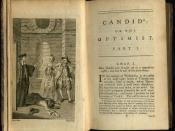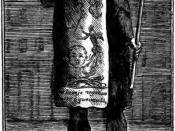Voltaire's "Candide" is a novel which contains conceptual ideas and at the same time is also exaggerated. Voltaire offers sad themes disguised by jokes and witticism, and the story itself presents a distinctive outlook on life. The crucial contrast in the story deals with irrational ideas as taught to Candide about being optimistic, versus reality as viewed by the rest of the world.
The main theme which is presented throughout the novel is optimism. Out of every unfortunate situation in the story, Candide, the main character, has been advised by his philosopher-teacher that everything in the world happens for the better, because "Private misfortunes contribute to the general good, so that the more private misfortunes there are, the more we find that all is well" (Voltaire, p. 31). Pangloss, the philosopher, tries to defend his theories by determining the positive from the negative situations and by showing that misfortunes bring some privileges.
As Candide grows up, whenever something unfortunate happens, Pangloss would turn the situation around, bringing out the good in it. Candide learns that optimism is "The passion for maintaining that all is right when all goes wrong " (Voltaire, p.86).
According to Rene Pomeau, "Voltaire-Candide...have made him [Candide] acquainted with the bad and the good side of human existence. The moral of Candide is born out of its style; it is the art of extracting happiness from the desolate hopping-about of the human insect" (Adams; Pomeau p.137). Pomeau explains that Candide shows both sides of humanity; how both great and terrible events are standard in a human life. Also according to Pomeau, the whole point of the story is to debate between good and bad; for example, as Candide becomes more independent, he starts to doubt that...


